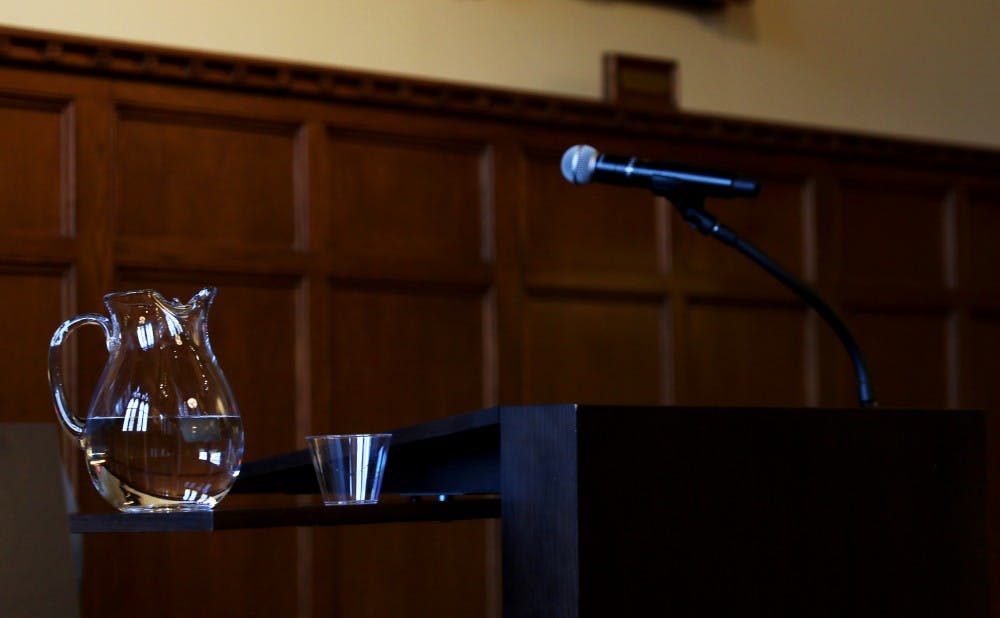Parker Martin, a master’s student in the Sanford School of Public Policy, has a copy of LIFE magazine hanging on the wall of his bedroom, depicting the Watts riots of 1965. Martin was looking at it recently, he said at a Tuesday morning panel discussion, when he turned to his grandmother. “I was like, ‘You know what, ain’t much changed since then,”” he said.
Her voice cracked as she replied, he said. “You know what, baby, you’re right. Unfortunately, you’re right. Ain’t nothing changed.”
“This woman has fought for so long, and we’re fighting for the exact same stuff that she fought for, her parents fought for, her grandparents fought for, people before her, we’re just trying to get treated right and take back what we’re owed to get equal outcomes. And it’s exhausting,” Martin said.
Martin shared the conversation with his grandmother at a panel called “Being Black in America.” The discussion was the second session at “Living While Black,” a Tuesday event organized by the Office of the Vice Provost for Faculty Advancement and the Office for Institutional Equity
The panel included a range of student voices and distinguished professors. The panelists explored the various facets of what it means to be Black in America, from damaging health disparities to racial discrimination that permeates universities like Duke.
For senior David Moore, being Black in America is going into a 7-Eleven, walking out and then being accused of stealing cookies he never touched. Being Black in America is being looked at in history class when the topic of slavery comes up, he said. It’s getting into Duke on his own merits and then being told by white peers that he has been accepted only because of the color of his skin.
“Being Black in America is consistently being told that you are not American but rather that you are African hyphen space American,” he said. “You are not one of us. And you are not good enough.”
Senior De’Ja Wood, a first-generation student, said that being Black in America is rooted in her family’s history. Her grandmother cleaned homes in the same neighborhood where Wood eventually attended high school. Her grandfather fought in World War II, but didn’t receive many of the benefits he was supposed to receive. He drove trucks to make a living.
In her high school history classes, Wood repeatedly argued with her classmates, who insisted that Black people were poorer and less educated because they simply didn’t work hard enough.
Wood also underscored the particular experience of being a Black woman in America.
“As a Black woman, my voice will often not be heard,” she said. “In the fight for justice, we so often focus on Black men; however we don't talk about the fact that Black women are at the intersection of violence because of their gender and their race.”
Gwenaelle Thomas, a Ph.D. student in neurobiology, shared the struggles she faces on a daily basis.
“My living while Black is maintaining daily productivity while processing trauma that people tell me how to react and police my tone,” she said. “It’s watching people create revisionist history and claim this is not what Dr. King died for while conveniently forgetting he was assassinated.”
She spoke to inequities at Duke that complicate her experience. “My living while Black is navigating these inequities, succeeding regardless, then having my accomplishments diminished to my skin color,” she said.
Thomas referenced a quote from Zora Neale Hurston: “If you are silent about your pain, they’ll kill you and say you enjoyed it.”
Silence promotes violence, Thomas said. She said that every time she speaks out, she risks losing her career or endangering her physical safety.
“Nevertheless, I will continue to speak out,” she said. “If you feel uncomfortable, good. Welcome to my reality. I’m uncomfortable every single day.”
Get The Chronicle straight to your inbox
Sign up for our weekly newsletter. Cancel at any time.

Chris Kuo is a Trinity senior and a staff reporter for The Chronicle's 118th volume. He was previously enterprise editor for Volume 117.

